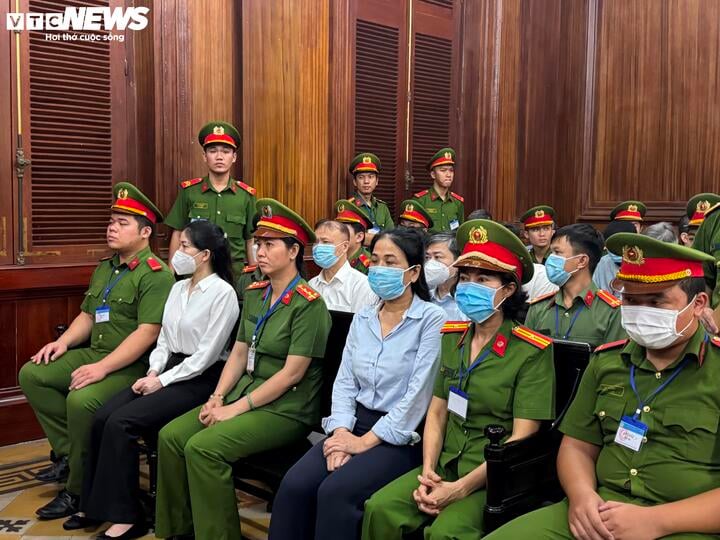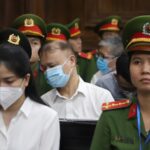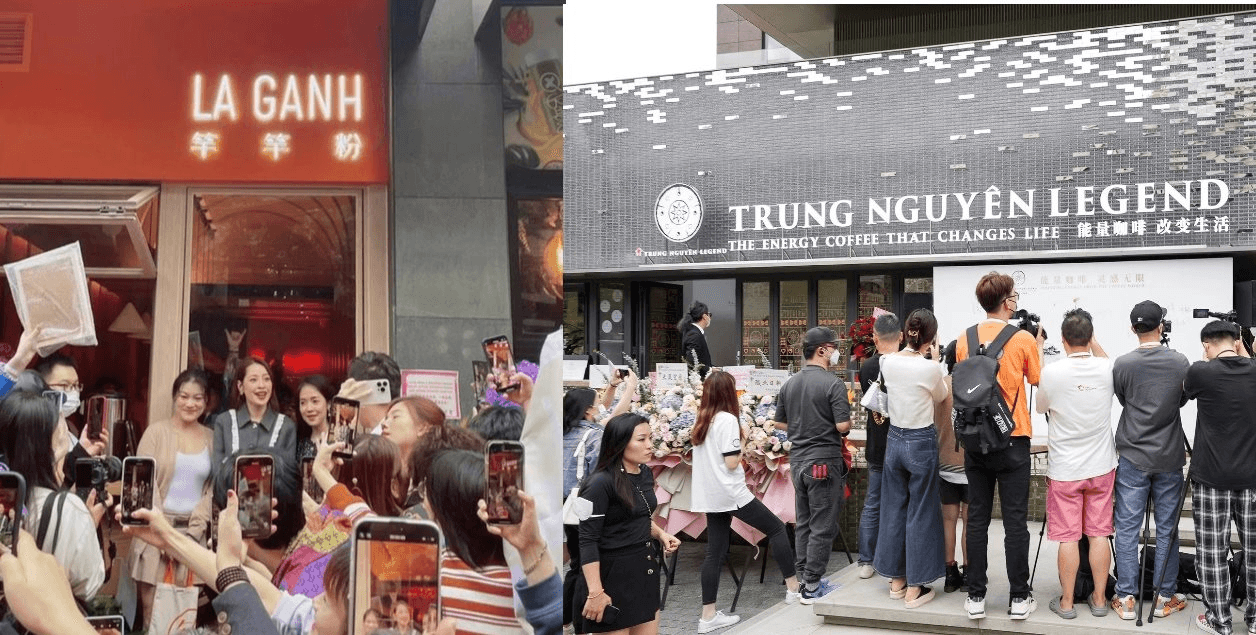On November 21, the trial for the case involving the Trading, Transportation, and Tourism Company, Xuyên Việt Oil, continued with the cross-examination of the defendants.
In response to the lawyer’s questions, defendant Tran Duy Dong, former head of the Domestic Market Department (Ministry of Industry and Trade), asserted that he did not know anyone at Xuyên Việt Oil Company.
The defendant only met Nguyen Van Thang (Deputy Director of Hanoi Branch, Xuyên Việt Oil) through an introduction by Hoang Anh Tuan, former deputy head of the Domestic Market Department. Thang, as introduced, had a small gift to send. According to defendant Dong, the review of the dossier and the re-granting of the license to Xuyên Việt Oil were entirely carried out by Tuan.

The defendants in court.
In court, defendant Hoang Anh Tuan admitted that he had not fully checked the business premises of Xuyên Việt Oil before proposing the granting of the license. Tuan explained that due to the impact of the COVID-19 pandemic and social distancing, he could not inspect them directly but still proposed the granting of the license due to “pressure from higher-ups.”
According to the indictment, in June 2021, Xuyên Việt Oil’s business license was about to expire, but the company did not meet the conditions for renewal. Mai Thi Hong Hanh, Chairwoman of Xuyên Việt Oil, instructed Nguyen Van Thang to contact and bribe leaders of the Domestic Market Department and the Ministry of Industry and Trade for support.
Hanh contacted Nguyen Loc An, former deputy head, to ask Do Thang Hai, former Deputy Minister of Industry and Trade, for intervention. Through introductions, she met Hoang Anh Tuan, who then reported to Tran Duy Dong. The two leaders agreed to “create favorable conditions” for the company as directed by Deputy Minister Hai.
On June 17, 2021, Hanh gave Nguyen Van Thang $10,000 to pass on to Hoang Anh Tuan. However, Thang only gave $5,000, and the rest was transferred to the branch’s fund. A week later, when Thang submitted the dossier, Hoang Anh Tuan signed a notice of refusal to grant the license because the company did not meet the conditions regarding wharves, receiving warehouses, and the gasoline and oil distribution system.
Facing this difficulty, Hanh continued to instruct the purchase of another enterprise to meet the conditions regarding the number of retail agents and gave Thang $300,000 as a “lubricant.” Thang kept $50,000, and the remaining $250,000 was brought to Tran Duy Dong’s office with the message: “Ms. Hanh has a gift for you.” This amount was later shared by Dong and Tuan.
In November 2021, the Ministry of Industry and Trade organized an inspection team for the licensing conditions of Xuyên Việt Oil, with Hoang Anh Tuan as the team leader. This time, Mai Thi Hong Hanh again instructed to give Tuan $10,000. Thanks to this, the company met the standards and was granted a gasoline and oil business license until 2026.
In court, defendant Mai Thi Hong Hanh admitted to all acts of bribery as stated in the indictment. Regarding the violations related to the Gasoline and Oil Price Stabilization Fund (BOG Fund), she affirmed that she was the head of the company and took full responsibility. However, she refused to answer the lawyer’s questions related to the details of this violation.
Regarding compensation for damages, Mai Thi Hong Hanh committed to remedying the consequences, not only for her actions but also for those of the defendant Nguyen Thi Nhu Phuong, deputy director of the company.
The Phone Call Between Former Deputy Minister Do Thang Hai and the “Godmother” of Cross-Border Oil Trade
A pivotal point of focus for the VKSND representative was to elucidate the purpose and content of the phone call between the former Deputy Minister of Industry and Trade and the “godmother” of the Vietnam Oil scandal.
The Greedy Tycoon: How the Chairman of Vietsopetro Embezzled Billions in Tax Money for Personal Gain
The accused, Mai Thi Hong Hanh, is alleged to have embezzled 1.4 trillion VND (approximately 60 million USD) in taxes and gasoline and oil stabilization funds. The funds were allegedly used to purchase real estate, lend money to friends, and bribe officials.










































